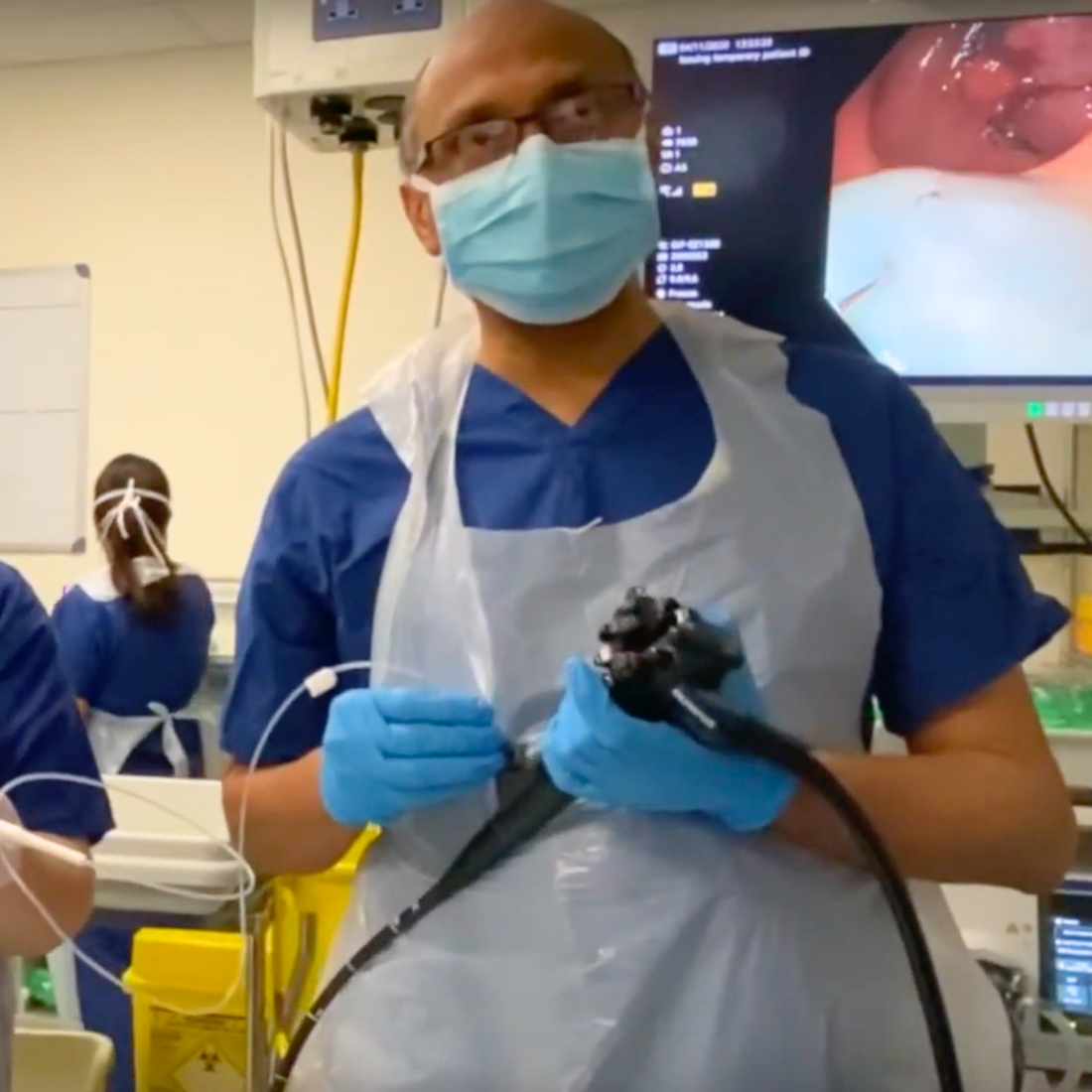Professor Pradeep Bhandari, a leading gastroenterologist in the UK and Deputy VP Endoscopy at the British Society of Gastroenterology, demonstrates his best practice technique for tattoo marking of a polyp in the descending colon using Black Eye™, a sterile and reliable endoscopic marker.
Professor Pradeep Bhandari has expertise in managing various gastrointestinal conditions such as early cancers, Barrett's oesophagus, acid reflux, irritable bowel syndrome, dyspepsia, peptic ulcers, rectal bleeding, and obesity, among others. He serves as a Consultant Gastroenterologist at Portsmouth Hospitals University NHS Trust and as a Professor of Gastroenterology at the University of Portsmouth.
Previously, Professor Bhandari was the Chair of the European Society of Gastrointestinal Endoscopy (ESGE) Research Committee from June 2018 to 2022 and was the Director of the National Endoscopy Training Centre at Queen Alexandra Hospital in Portsmouth from June 2014 to 2019. He has also served as the Treasurer of the British Society of Gastrointestinal Endoscopy (2013-2016), a Specialist Advisor to the National Institute of Clinical Excellence (NICE) on endoscopic interventions from 2009 to 2012 and 2016 to 2019, and since 2009 he has served as a Specialist Advisor to Health Technology Assessment (HTA), a Department of Health Research Grants body.
Professor Bhandari's other notable positions include being a core member of the BSG Endoscopy Research Committee, Associate Editor of the Digestive Endoscopy Journal from 2011 to 2014, and Associate Editor of Diseases of Oesophagus from 2017 to 2020. He has also received several international awards, including Clinical Excellence awards, the ASGE Crystal award for Best International Research in 2016 at DDW San Diego, the Barbour Freeland Award from the Royal College of Physicians (Edinburgh) for significant contribution to Endoscopic innovations and research in 2015, the Hopkins Endoscopy Award from the British Society of Gastroenterology in 2012, the ASGE Crystal award for Best International Endoscopy Research in 2013 at DDW, and the AGA Crystal award for Best International Patient-Friendly Research in 2011 at DDW.
Professor Bhandari is highly trained and has worked in various hospitals in the Wessex region, including Poole, Bournemouth, Southampton, and Winchester. In 2004, he received a visiting fellowship to work at one of the world's leading endoscopy units at the National Cancer Centre in Tokyo, Japan. There he worked with pioneers of new endoscopic techniques involved in the diagnosis and endoscopic treatment of cancers. Based on his experience and skills acquired in Japan, Professor Bhandari has significantly influenced the diagnosis, screening, surveillance, and treatment of gastrointestinal cancers in the UK. He regularly receives referrals from other regional hospitals for chromoendoscopy and endoscopic mucosal resection (endoscopic removal of cancers without the need for radical surgery).
Involved in several key organisations in his field, including the British Medical Association (BMA), Royal College of Physicians, European Society of Gastrointestinal Endoscopy, and American Society of Gastrointestinal Endoscopy, Professor Bhandari continues to make significant contributions to his profession. He currently holds the Deputy VP Endoscopy at the British Society of Gastroenterology (BSG). In 2013, he received both the Hopkins Endoscopy Award from the British Society of Gastroenterology for technical innovation in the field of endoscopy and the Crystal Award from the American Gastroenterology Association for research in early cancer diagnosis.
Using Black Eye™ for tattoo marking of a polyp in the descending colon
In this video, Professor Bhandari demonstrates the use of Black Eye™ for tattoo marking of a polyp in the descending colon, showcasing his best practice technique. Black Eye™ is a single-use, sterile tattoo marker that comes in a pre-filled syringe with a Luer lock system for secure and convenient usage. The stable inorganic viscous emulsion pigment provides a permanent carbon black tattoo, ensuring lifetime surveillance for patients. The syringes are biocompatible and non-toxic, and each comes with a patient record label to enable easy traceability. With blister packs to minimize the risk of cross-contamination, Black Eye™ is a safe and reliable endoscopic marker for lesions that require surgical removal within 30 days.
Order now direct or via your relevant national framework agreement. Alternatively, call us on 01962 626364 or email sales@omnimed.co.uk NHSSC commitment breaks available.
To discuss how we can get you the best deal on Black Eye™ and many other products, you can book a call with our sales team at a day and time convenient for you.
Quote this code to get 10% off your first order BK10-0423-N
Offer ends 30-04-2023. T&Cs apply.
